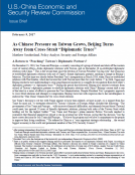
In December 2016, Sao Tome and Principe—a country consisting of a group of islands and islets off the western coast of central Africa—broke diplomatic relations with Taiwan, and re-established diplomatic relations with China. The issue brief describes what happened, what it means for Taiwan, and how it fits into a series of measures that Beijing has taken to pressure Taiwan since the election of Taiwan’s President Tsai Ing-wen. •This is the second time since President Tsai’s election that Beijing has re-established diplomatic relations with one of Taipei’s former diplomatic partners—of which it now has only 21—marking a change in Beijing’s behavior. In 2008, Taipei and Beijing reached a tacit understanding to stop competing for recognition from each other’s diplomatic partners—a “diplomatic truce.” During the period that followed, Beijing also rejected overtures from several of Taiwan’s diplomatic partners to establish diplomatic relations with China. •Taiwan’s diplomatic relationships are significant for symbolic and practical reasons. Although, Taiwan almost certainly gains more from its unofficial relations with countries that have extensive international influence, such as the United States, diplomatic relations are an important component of Taiwan’s toolbox for maintaining a presence on the international stage. •Despite President Tsai’s pragmatic approach to cross-Strait relations and attempts to compromise, Beijing views her with suspicion due to her unwillingness to endorse the “one China” framework for cross-Strait relations. Other measures that Beijing has taken to pressure Taipei since President Tsai’s election include suspending official and semiofficial cross-Strait communication and meetings and excluding Taiwan from meetings of international organizations, among others.
